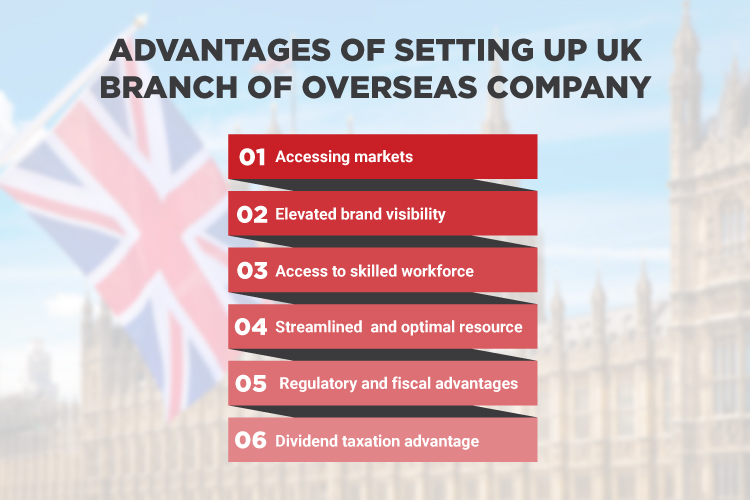- Notifications
We will only notify the newest and revelant news to you.
In an increasingly globalized economy, businesses often seek to expand their operations into new territories to capitalize on emerging markets and diversify their revenue streams. For companies eyeing the United Kingdom (UK) as a potential market, registering as an overseas company may seem like a strategic move. In this article, these insights can support you on establishing a UK branch of an overseas company journey.
Setting up a UK branch of an overseas company offers several strategic benefits, making it an attractive option for international businesses seeking to expand their operations.
These are 6 pros of UK company formation journey below, including:
Creating a UK branch facilitates entry into a profitable market. The United Kingdom, boasting the world's fifth-largest economy with a GDP of $3.03 trillion in 2020 (source: World Bank), hosts over 66 million inhabitants, including a substantial cohort of affluent consumers. This scenario presents ample growth opportunities for businesses seeking to expand.
Operating a UK branch for an international company enables leveraging the UK's esteemed reputation for business prowess. The UK secured the 8th spot in the World Bank's Ease of Doing Business Index 2020, signaling its transparent business climate and regulatory efficiency. Aligning with the UK enhances brand visibility and credibility, drawing the attention of potential clients and partners.
The UK boasts a highly skilled workforce, with 41% of individuals aged 25-64 holding tertiary education degrees (source: OECD). This skilled labor pool enables businesses to tap into diverse expertise across various sectors. Furthermore, the UK fosters innovation through dynamic tech hubs like London, fostering collaboration between businesses and research entities.
Establishing a UK branch enables companies to capitalize on existing resources, infrastructure, and operational capabilities, thus reducing the necessity for additional investments and overhead costs. Centralizing certain functions and activities within the UK branch allows companies to achieve economies of scale, streamline operations, and enhance efficiency in areas such as procurement, logistics, and customer service.
Establishing a UK branch can yield regulatory and tax benefits for international companies, contingent upon their specific circumstances and business activities. Favorable regulatory frameworks, incentives, and support schemes aimed at stimulating foreign investment, innovation, and entrepreneurial ventures are available in the UK.
Notably, the UK does not impose withholding tax on dividends paid by UK companies to shareholders domiciled in another country, presenting a significant advantage for international businesses operating within its jurisdiction. Furthermore, with the current Corporation Tax rate standing at 25%, the lowest among the G7 nations, companies can benefit from advantageous tax conditions (source: OECD).

Advantages of setting up UK branch of overseas company
Although opening a UK branch of an overseas company has several vital benefits, there are 3 primary disadvantages of registering as an overseas company in the UK. They are include:
The registration and operation of a UK branch necessitates adherence to a spectrum of legal and administrative duties. These encompass the registration of the branch with Companies House, the maintenance of current financial records, and the fulfillment of reporting mandates. Managing these administrative tasks can consume substantial time and incur costs, particularly for enterprises unacquainted with UK regulations. Engaging professionals specializing in company formation and compliance can facilitate the streamlining of these processes.
Engaging in operations as a UK branch entails navigating the multifaceted legal and regulatory framework of the UK. The UK maintains its distinct array of laws, which may deviate from those of the parent company's home jurisdiction. Comprehending and adhering to UK-specific regulations can present complexities, necessitating expert guidance to ensure legal conformity and mitigate potential risks.
A UK branch functions as a direct extension of the overseas parent company, thereby entailing that the parent company retains unrestricted liability for the branch's endeavors. In instances of financial adversity or legal entanglements, the assets of the parent company may be exposed to jeopardy. Undertaking a comprehensive risk assessment and contemplating suitable legal arrangements, such as the establishment of a subsidiary, can aid in alleviating potential financial liabilities.
A foreign branch associated with a UK company must adhere to the tax filing and payment requirements of the country where it operates. Furthermore, the branch's financial results will be consolidated with the company's other activities in both its financial statements and, unless an alternative is elected, its UK corporation tax return.
As a result, if a foreign branch incurs losses, these losses are factored into the UK corporation tax calculation, allowing the company to offset them against its overall corporation tax liability.
In cases where the branch generates profits, it is liable to pay taxes in the foreign jurisdiction at local tax rates. Additionally, the branch's profits are subject to UK corporation tax. The UK provides double tax relief (DTR) for overseas taxes, although this relief is limited to the UK corporation tax rate. Please refer to the examples provided below, illustrating scenarios where the overseas tax rate exceeds, falls short of, or matches the UK rate.
When determining the UK corporation tax attributable to the branch's profits for the purpose of calculating the amount of DTR that can be claimed, consideration must be given to allowable deductions and expenses directly linked to the branch income, as well as a reasonable portion of overhead costs. This may further restrict the amount of DTR available.
When initiating the registration process for a UK branch, it's essential to recognize that this entity is sometimes denoted as a UK establishment, a term introduced following the enactment of the Overseas Companies Regulations in 2009. In certain UK government documentation, you might encounter references to UK branches being grouped under the broader category of UK establishments.
To establish a UK branch, the initial step involves registering your branch with Companies House, the official registrar of companies in the UK. Any overseas company establishing a UK branch must designate a name for the branch, which can either be the original company name or an alternative designation under which it intends to operate within the UK. Prior to commencing the registration process, seeking guidance from specialists who specialize in registering overseas companies in the UK is advisable. This is because the application form for registering a UK branch can be quite intricate, requiring the attachment of supporting documents alongside the applicable registration fee.

Setting up a UK branch of an overseas company
The supporting documentation requested by Companies House typically includes a certified copy of your company's constitutional documents, along with an English translation, although this requirement may vary depending on your company's specific disclosure obligations. Additionally, Companies House may request a copy of your most recent financial statements, accompanied by an English translation.
Subsequent to the completion of the registration process, your company will bear ongoing responsibilities to submit and disclose certain information to Companies House. It will be necessary to maintain a registered office address for your UK Branch throughout the year, and you'll also be mandated to uphold the relevant statutory registers throughout the financial year. Furthermore, any alterations to your UK branch must be promptly reported to Companies House as they arise. Seeking guidance from a reputable company registration service provider can assist you in understanding your obligations in this regard, as well as offering advice on your UK Branch Office's statutory account filing requirements.
Latest news & insights from around the world brought to you by One IBC's experts